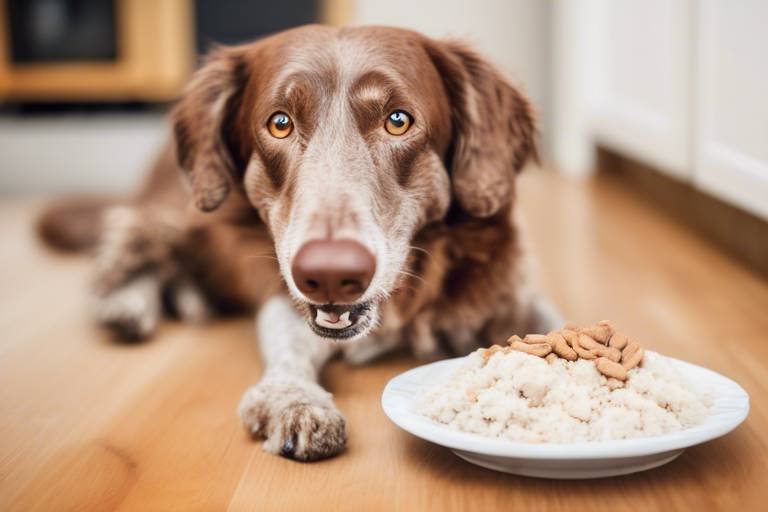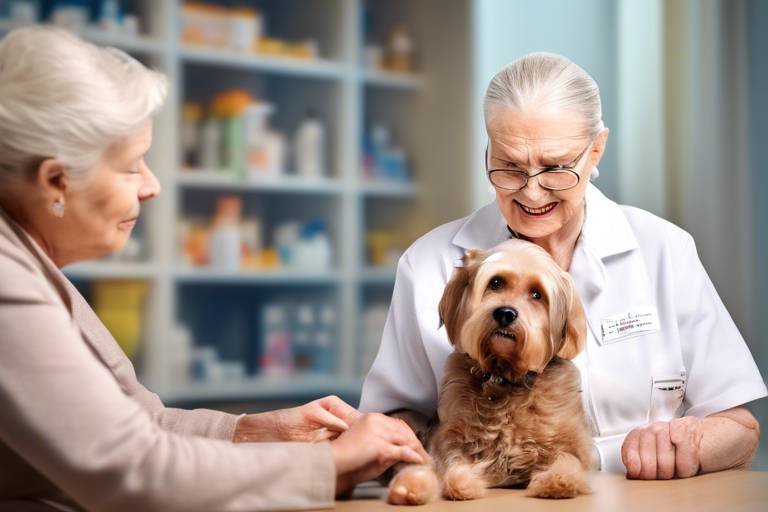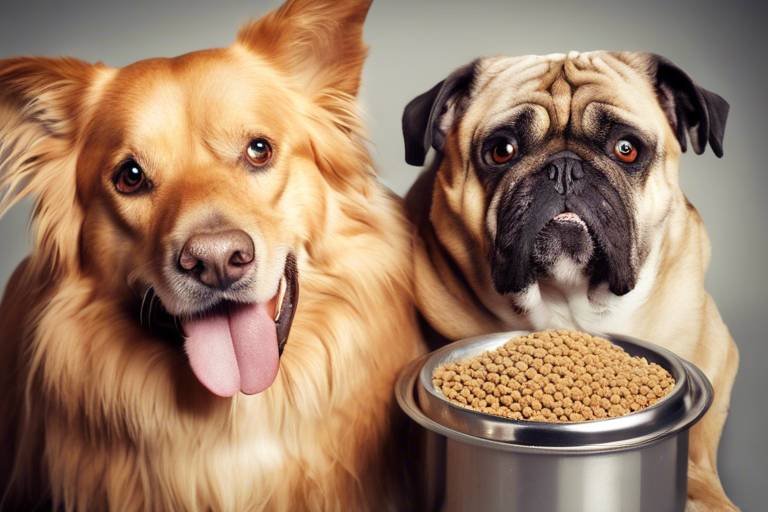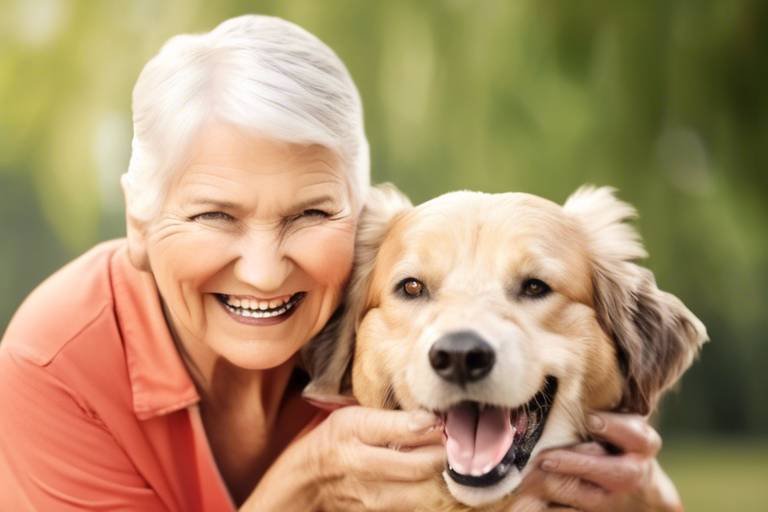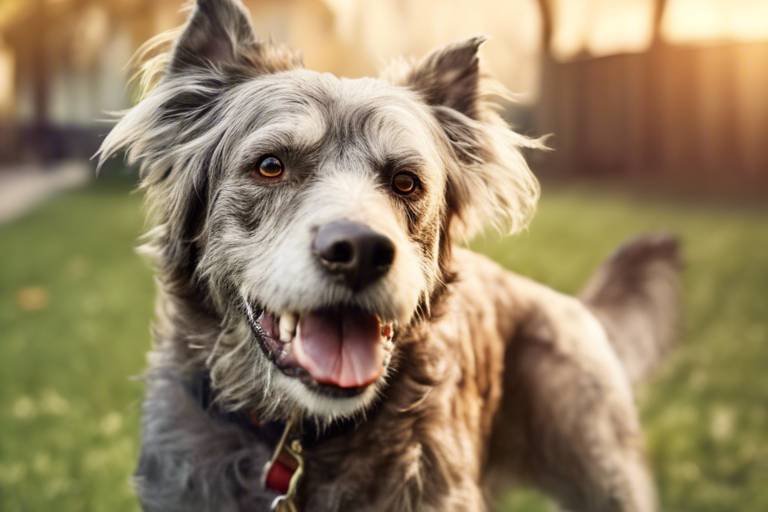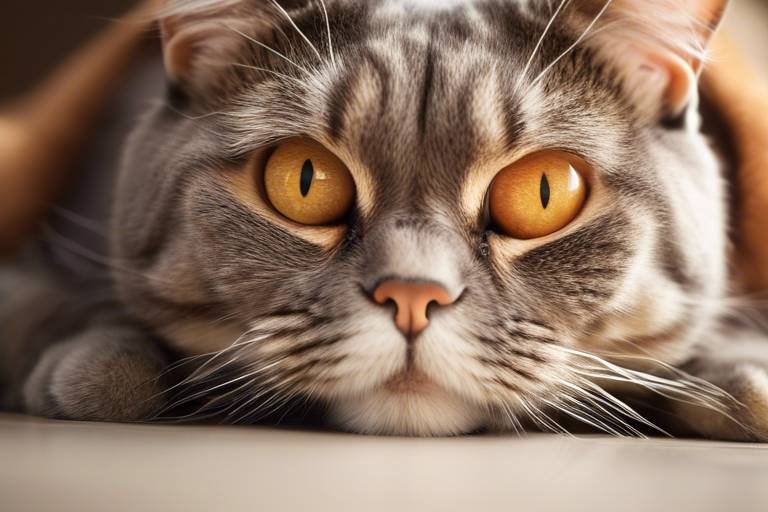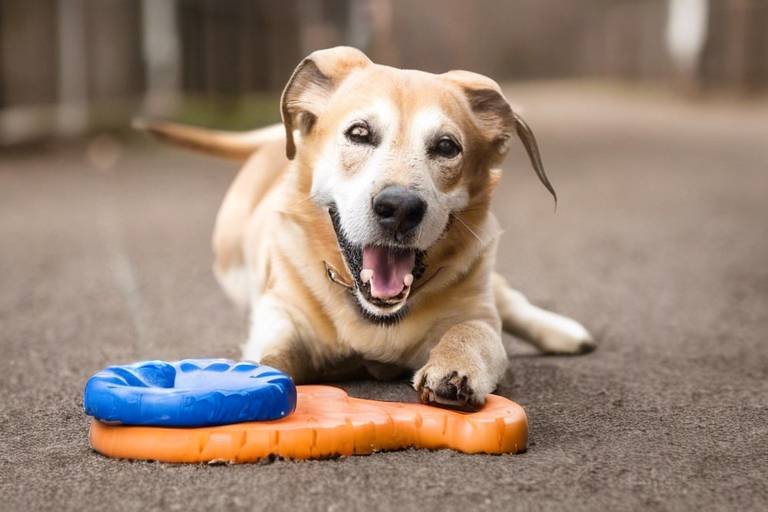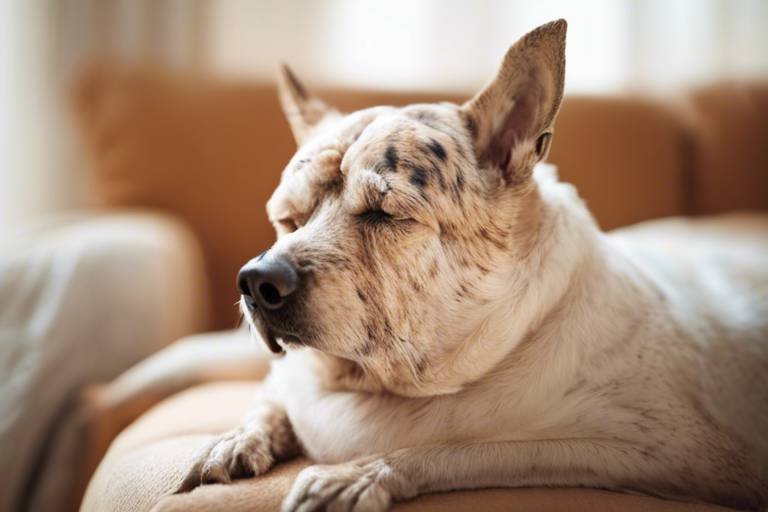How to Help Senior Pets with Dietary Restrictions
As our beloved pets age, they often develop a variety of dietary restrictions that can complicate their nutritional needs. Just like humans, senior pets may face challenges such as allergies, sensitivities, and specific health conditions that require a tailored approach to their diet. It's crucial to understand these restrictions to ensure our furry friends maintain a healthy and happy life in their golden years. In this article, we will explore effective strategies and tips for managing the dietary needs of senior pets, focusing on their unique requirements and how we can best support them.
Senior pets can experience a range of dietary restrictions that stem from various factors. Common issues include food allergies, which may manifest as skin irritations or gastrointestinal upset, and sensitivities to specific ingredients like grains or certain proteins. Additionally, health conditions such as kidney disease, diabetes, or obesity can necessitate a specialized diet. Understanding these dietary restrictions is not just about avoiding certain foods; it’s about ensuring that our pets receive the right balance of nutrients to thrive. For instance, a dog with kidney disease might require a diet lower in protein and phosphorus, while a cat with diabetes may benefit from a low-carb diet. By recognizing these needs, we can better cater to our pets' health and longevity.
Before making any significant changes to your senior pet's diet, it’s essential to consult a veterinarian. A professional can provide personalized dietary advice tailored to your pet's unique health needs and restrictions. They can conduct a thorough examination and recommend specific diets or ingredients that will support your pet’s health. Additionally, veterinarians can help you navigate the myriad of pet food options available on the market, ensuring you choose the best products for your furry friend. Remember, just as we wouldn’t self-diagnose our health issues, our pets deserve the same level of care and expertise.
Understanding your senior pet's nutritional requirements is crucial for their well-being. Factors such as age, weight, activity level, and existing health issues all play a vital role in determining their dietary needs. For example, an active senior dog may require more calories than a less active one, while a cat with hyperthyroidism might need a higher protein intake. To assess your pet's nutritional needs effectively, consider the following:
- Age: Older pets often require fewer calories but more nutrients.
- Weight: Maintaining a healthy weight is essential; overweight pets may need a calorie-restricted diet.
- Activity Level: More active pets may need additional calories and protein.
- Health Issues: Specific conditions require specialized diets to manage symptoms.
By evaluating these factors, you can create a personalized dietary plan that caters to your senior pet's needs.
Selecting appropriate ingredients is vital for senior pets. For instance, if your pet has a sensitivity to grains, opting for grain-free options can help alleviate gastrointestinal issues. On the other hand, if your pet has arthritis, including omega-3 fatty acids from fish oil can support joint health. Here’s a quick guide on ingredients to consider:
| Condition | Recommended Ingredients | Avoid |
|---|---|---|
| Food Allergies | Novel proteins (like duck or rabbit), sweet potatoes | Common allergens (like chicken, beef, or grains) |
| Kidney Disease | Low-protein, low-phosphorus foods | High-protein foods |
| Obesity | High-fiber, low-fat options | High-calorie treats |
By carefully selecting ingredients, you can help your senior pet feel their best while adhering to their dietary restrictions.
Learning how to read pet food labels effectively is essential for finding suitable options for your senior pet. Look for foods that list high-quality protein sources as the first ingredient, and be wary of fillers like corn and soy. Additionally, pay attention to the guaranteed analysis section for information on protein, fat, and fiber content. Avoid foods that contain artificial preservatives, colors, or flavors, as these can be detrimental to your pet's health. By being an informed consumer, you can make better choices for your furry friend.
Preparing homemade meals for senior pets can be a rewarding way to ensure they receive the right nutrition. Not only can you control the ingredients, but you can also create meals tailored to their specific needs. When crafting homemade diets, aim for a balance of protein, carbohydrates, and fats. For example, a simple recipe could include:
- Lean protein (like chicken or turkey)
- Vegetables (like carrots or green beans)
- Whole grains (like brown rice or quinoa)
Consult your veterinarian for specific recipes and portion sizes to ensure your homemade meals are balanced and nutritious.
Regular health monitoring is essential for senior pets. Tracking weight, health changes, and dietary impacts on their overall well-being can help you make necessary adjustments to their diet. Keep an eye out for any signs of weight gain or loss, and consult your veterinarian if you notice significant changes. Regular check-ups can also help catch potential health issues early, allowing for timely intervention.
Being vigilant about your senior pet's health is crucial. Recognizing signs that indicate dietary problems, such as gastrointestinal issues or changes in behavior, can help you address their needs promptly. Some common signs to look for include:
- Vomiting or diarrhea
- Excessive scratching or licking
- Changes in appetite
- Weight loss or gain
If you observe any of these symptoms, it’s important to consult your veterinarian to determine the best course of action.
As senior pets age, their dietary needs may change. It’s essential to remain flexible and adjust their diet accordingly to maintain their health and comfort. For instance, if your pet develops a new health condition, you may need to modify their diet to accommodate this change. Regular consultations with your veterinarian can provide guidance on how to make these adjustments effectively, ensuring your pet continues to thrive as they age.
1. How do I know if my pet has dietary restrictions?
If you notice changes in your pet's behavior, appetite, or health, it may indicate dietary restrictions. Consult your veterinarian for an assessment.
2. Can I feed my senior pet human food?
Yes, but be cautious. Some human foods are safe, while others can be harmful. Always check with your veterinarian before introducing new foods.
3. How often should I consult my veterinarian about my senior pet's diet?
Regular check-ups, at least once a year, are recommended, but more frequent visits may be necessary if your pet has health issues.
4. Are there specific brands of pet food recommended for senior pets?
There are many high-quality brands specifically formulated for senior pets. Consult your veterinarian for recommendations based on your pet's health needs.
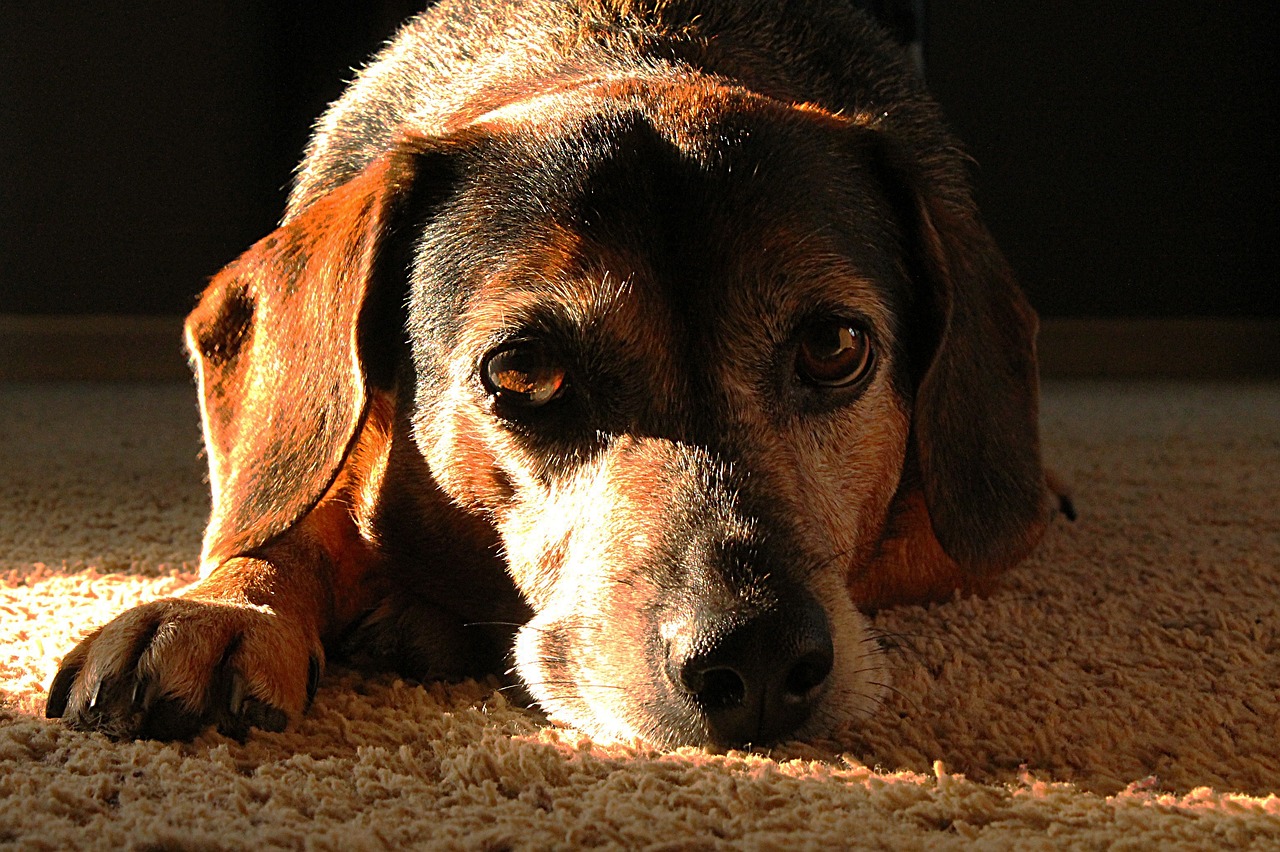
Understanding Dietary Restrictions
As our beloved pets age, their dietary needs often become more complex. Just like humans, senior pets can develop a variety of dietary restrictions that require special attention. These restrictions can stem from several factors, including allergies, sensitivities, and specific health conditions that necessitate a tailored diet for optimal health and longevity. Understanding these dietary needs is crucial for ensuring that your furry friend remains happy and healthy in their golden years.
Common dietary restrictions in senior pets can include:
- Food Allergies: Some pets may develop allergies to ingredients they previously tolerated. Common allergens include chicken, beef, and grains.
- Sensitivities: In addition to allergies, pets may experience sensitivities to certain foods, leading to gastrointestinal issues or skin problems.
- Health Conditions: Conditions such as diabetes, kidney disease, and obesity require specific dietary adjustments. For instance, diabetic pets may need lower carbohydrate diets, while those with kidney issues may benefit from reduced protein intake.
It's essential to recognize that each pet is unique, and their dietary restrictions may vary widely. For example, while one dog may thrive on a grain-free diet, another might require a high-fiber diet to manage gastrointestinal health. This variability means that pet owners must be vigilant and observant of their pets' reactions to different foods.
Moreover, changes in a senior pet's metabolism can affect how they process food. As pets age, their bodies may become less efficient at digesting certain nutrients, making it even more important to choose the right diet. A balanced diet not only supports their physical health but also contributes to their overall well-being, keeping them active and engaged.
In summary, understanding dietary restrictions in senior pets involves recognizing the common issues they face, being aware of their unique needs, and adjusting their diets accordingly. By taking these factors into account, you can help ensure that your senior pet enjoys a healthy and fulfilling life.

Consulting a Veterinarian
When it comes to managing the dietary needs of your senior pet, consulting a veterinarian is not just a good idea—it's crucial. Think of your vet as your pet's personal nutritionist, equipped with the knowledge and expertise to tailor a diet that meets your furry friend's unique health requirements. Just like humans, pets can face a myriad of health issues as they age, and these can significantly affect their dietary needs. From allergies to kidney disease, understanding these conditions is the first step in ensuring your pet enjoys a long and healthy life.
During your visit, your veterinarian will likely conduct a thorough examination, which may include blood tests and other diagnostic procedures. These tests help identify underlying health issues that could be influencing your pet's dietary restrictions. For instance, if your senior dog is showing signs of weight loss or lethargy, it could be due to a thyroid issue or another metabolic condition. By pinpointing these problems, your vet can recommend a specific diet or even a specialized prescription food that caters to your pet's needs.
It's essential to have an open dialogue with your veterinarian about your pet's eating habits and any changes you've noticed. Have they become picky eaters? Are they experiencing gastrointestinal discomfort? Sharing this information can help your vet make informed recommendations. Additionally, don't hesitate to ask questions about ingredients, portion sizes, and feeding schedules. Your vet can provide valuable insights into how to transition your pet to a new diet smoothly, minimizing any potential digestive upset.
For senior pets with multiple health concerns, the dietary landscape can become quite complex. This is where a personalized dietary plan comes into play. Your veterinarian may suggest a combination of commercial pet foods and home-cooked meals, ensuring that your pet receives a balanced diet rich in the nutrients they need. They can also guide you on supplements that may benefit your pet's specific health conditions, such as omega-3 fatty acids for joint health or probiotics for digestive support.
In summary, consulting a veterinarian is an indispensable part of managing your senior pet's dietary restrictions. Their expertise can help you navigate the often confusing world of pet nutrition, ensuring that your beloved companion receives the best care possible. Remember, a well-informed pet owner is the first step toward a healthier, happier pet!
- How often should I consult my veterinarian about my senior pet's diet? It's recommended to have regular check-ups at least once a year, but more frequent visits may be necessary if your pet has health issues.
- Can I feed my senior pet homemade food? Yes, but it's crucial to consult your veterinarian to ensure the meals are balanced and meet all nutritional needs.
- What signs should I look for that indicate my pet's diet needs to be adjusted? Look for changes in weight, energy levels, coat condition, and any gastrointestinal issues like vomiting or diarrhea.
Assessing Nutritional Needs
When it comes to our beloved senior pets, understanding their nutritional needs is as crucial as knowing their favorite toy or spot on the couch. Just like humans, as pets age, their bodies undergo various changes that can significantly affect their dietary requirements. So, how do we figure out what our furry friends need? It’s a bit like piecing together a puzzle, where every piece represents a different aspect of their health.
First and foremost, consider your pet's age. Senior pets, typically classified as those over seven years old, may have different metabolic rates compared to their younger counterparts. This means they might need fewer calories but more nutrients to support their aging bodies. For example, a senior dog might require a diet lower in fat but higher in fiber to aid digestion, while a senior cat may need more protein to maintain muscle mass.
Next, think about their weight. Obesity is a common issue in senior pets, often leading to a host of health problems like diabetes or joint issues. Regularly weighing your pet and adjusting their food intake accordingly is essential. If your pet is overweight, you might want to look for weight management formulas that provide fewer calories while still offering the necessary nutrients. On the other hand, if your pet is underweight, it’s crucial to consult with your vet to determine a suitable diet that promotes healthy weight gain.
Another important factor is their activity level. Is your senior pet still chasing after squirrels or has he become more of a couch potato? The amount of exercise they get directly influences their caloric needs. Pets that are less active may require fewer calories, while those who still enjoy playtime may need a more balanced diet to keep their energy levels up.
Lastly, consider any existing health issues. Senior pets are often prone to various health conditions, such as arthritis, kidney disease, or allergies. Each of these conditions can necessitate specific dietary adjustments. For instance, pets with kidney issues might benefit from a diet lower in protein and phosphorus, while those with arthritis may need added omega-3 fatty acids for joint support. It’s essential to have an open dialogue with your veterinarian to tailor a diet that addresses these unique challenges.
In summary, assessing your senior pet's nutritional needs involves evaluating their age, weight, activity level, and any existing health issues. It’s about creating a balanced diet that not only meets their needs but also enhances their quality of life. Just remember, every pet is unique, and what works for one may not work for another. Keep an eye on them, make adjustments as necessary, and you’ll both enjoy the golden years together!
Choosing the Right Ingredients
When it comes to feeding our beloved senior pets, choosing the right ingredients can feel like navigating a maze. With age comes a variety of dietary restrictions that can make it challenging to find the perfect balance of nutrition. It's essential to understand that not all ingredients are created equal, especially for our furry friends who may have specific health needs. So, how do we ensure that we're selecting the best ingredients for their meals? Let's break it down.
First and foremost, it’s crucial to prioritize high-quality protein sources. Senior pets often require more protein to maintain their muscle mass and overall health, but not just any protein will do. Look for options like chicken, turkey, or fish, which are not only digestible but also packed with essential amino acids. Avoid fillers like corn and soy, as these can lead to allergies or sensitivities in some pets.
Next, consider the importance of healthy fats. Omega-3 and Omega-6 fatty acids are fantastic for keeping your pet’s coat shiny and skin healthy. Ingredients like fish oil or flaxseed can be beneficial. However, moderation is key. Too much fat can lead to obesity, which is a common concern among senior pets. A balanced diet is one that includes just the right amount of these nutrients.
Don’t forget about fiber, which plays a vital role in digestive health. Senior pets can suffer from constipation or other gastrointestinal issues, so incorporating fiber-rich ingredients like sweet potatoes, pumpkin, or brown rice can help keep things running smoothly. It’s all about finding that sweet spot where their digestive system feels comfortable.
Additionally, be mindful of carbohydrates. While carbs can provide energy, many senior pets are less active than they used to be. Opt for complex carbohydrates that provide sustained energy without the sugar spikes. Ingredients like quinoa or oats are excellent choices. They not only offer energy but also come with added vitamins and minerals.
To make things easier for you, here’s a quick table summarizing some ingredients to include and avoid:
| Include | Avoid |
|---|---|
| High-quality meats (chicken, turkey, fish) | Fillers (corn, soy) |
| Healthy fats (fish oil, flaxseed) | Excessive fat |
| Fiber-rich veggies (sweet potatoes, pumpkin) | High-sugar ingredients |
| Complex carbs (quinoa, oats) | Simple carbs (white rice, bread) |
Finally, always remember that freshness matters. Whenever possible, opt for fresh ingredients over processed ones. Fresh fruits and vegetables can provide a range of vitamins and antioxidants that are crucial for your pet’s immune system. Just be cautious with fruits like grapes and raisins, as they can be toxic to pets.
In conclusion, choosing the right ingredients for your senior pet is not just about filling their bowl. It’s about providing them with the nutrition they need to thrive in their golden years. By focusing on high-quality proteins, healthy fats, fiber, and complex carbohydrates, you can help ensure that your furry friend stays healthy, happy, and full of life.
Reading Labels Effectively
Understanding how to read pet food labels is like decoding a secret language that can significantly impact your senior pet's health. With so many options on the market, it’s crucial to become a savvy shopper. First and foremost, you should look for the ingredient list. Ingredients are typically listed in descending order by weight, meaning the first few items are what your pet will consume the most. For senior pets, it’s essential to ensure that high-quality protein sources, such as chicken or fish, are among the first ingredients.
Next, pay attention to the guaranteed analysis section, which provides information on the nutrient content of the food. This includes percentages of protein, fat, fiber, and moisture. Senior pets often require different nutrient ratios compared to younger pets, so make sure the food aligns with their specific needs. For instance, a diet lower in fat and higher in fiber can be beneficial for older dogs to maintain a healthy weight.
Another key element is the additives and preservatives. While some preservatives are necessary for shelf life, others can be harmful. Look for natural preservatives like tocopherols (vitamin E) instead of artificial ones. Additionally, be wary of any ingredients that sound like they belong in a chemistry lab rather than your pet’s food bowl. If you can’t pronounce it, it might be best to avoid it!
Moreover, consider the specific health needs of your senior pet. If your furry friend has dietary restrictions due to allergies or health issues, look for specialized formulas. These may include grain-free options or diets formulated for sensitive stomachs. It’s also beneficial to consult with your veterinarian about which specific ingredients to include or avoid based on your pet's unique circumstances.
Lastly, don’t forget to check for certifications or endorsements from reputable organizations. A seal of approval from a governing body can add an extra layer of trust. Remember, investing time in reading labels can lead to a happier, healthier life for your beloved senior pet. After all, wouldn’t you want the best for them, just as you would for a family member?
In summary, reading pet food labels effectively involves:
- Identifying high-quality protein sources at the top of the ingredient list.
- Understanding the guaranteed analysis for nutrient content.
- Being cautious of additives and preservatives.
- Choosing foods that cater to specific health needs.
- Looking for certifications from reputable organizations.
Homemade Diet Options
When it comes to our beloved senior pets, nothing says "I love you" quite like a homemade meal. Just like how we enjoy a hearty, home-cooked dinner, senior pets can benefit immensely from meals made with care and attention. A homemade diet allows you to control the ingredients, ensuring that your furry friend gets the nutrition they need while avoiding any harmful additives or allergens. But where do you start? It can feel overwhelming, but don’t worry! With a little guidance, you can whip up meals that are not only nutritious but also delicious.
First things first, it’s essential to consult with your veterinarian before making any drastic changes to your pet's diet. They can provide insights tailored to your pet's specific health issues, including allergies, sensitivities, or other dietary restrictions. Once you have that information, you can begin to explore what ingredients will work best for your senior companion.
When preparing homemade meals, aim for a balanced diet that includes:
- Proteins: Lean meats such as chicken, turkey, or fish are excellent choices. These proteins are vital for maintaining muscle mass and overall health.
- Carbohydrates: Whole grains like brown rice or quinoa, as well as vegetables like sweet potatoes and carrots, can provide the necessary energy.
- Fats: Healthy fats, such as fish oil or flaxseed oil, can support skin and coat health, which is particularly important for aging pets.
- Vitamins and Minerals: Incorporating a variety of fruits and vegetables can help meet your pet's vitamin and mineral needs.
Here’s a simple recipe to get you started:
Chicken and Rice Recipe for Senior Dogs Ingredients: - 1 cup of cooked chicken (shredded) - 1/2 cup of brown rice (cooked) - 1/2 cup of carrots (finely chopped) - 1/4 cup of peas (cooked) - 1 tablespoon of fish oil (optional) Instructions: 1. In a large bowl, combine the cooked chicken, rice, carrots, and peas. 2. Drizzle with fish oil if desired and mix well. 3. Serve warm, and store leftovers in the refrigerator for up to three days.
This recipe is not only easy to make but also packed with nutrients that can help keep your senior pet healthy and happy. Remember, the key to homemade diets is variety and balance. You can rotate different proteins and vegetables to keep your pet’s meals interesting while ensuring they receive a broad spectrum of nutrients.
Lastly, always monitor your pet’s health and weight when introducing new meals, as changes in diet can affect them in various ways. If you notice any adverse reactions, consult your veterinarian immediately. Making homemade meals can be a rewarding experience for both you and your pet, providing a deeper bond and a healthier lifestyle!
Q: Can I feed my senior pet the same homemade diet every day?
A: While consistency is good, it's essential to vary the ingredients to ensure your pet receives a balanced diet. Rotate proteins, carbohydrates, and vegetables to provide a wide range of nutrients.
Q: Are there any ingredients I should avoid when making homemade meals?
A: Yes! Ingredients like onions, garlic, chocolate, grapes, and raisins are toxic to pets and should always be avoided. Always consult your vet for a complete list of harmful foods.
Q: How can I tell if my homemade diet is working for my senior pet?
A: Keep an eye on their weight, energy levels, and overall health. Regular vet check-ups can also help monitor their condition and dietary effectiveness.

Monitoring Health and Weight
When it comes to our beloved senior pets, keeping an eye on their health and weight is not just important—it's absolutely crucial. Think of it like being a detective; you need to observe every little change in their behavior, appetite, and energy levels. As pets age, their bodies undergo various changes, which can significantly impact their dietary needs and overall well-being. Just as we might feel different as we age, so do our furry friends!
Regular health monitoring allows you to catch potential issues before they escalate. For instance, a slight change in your pet's weight can indicate an underlying health problem. If Fluffy suddenly loses a few pounds, it might be a sign of dental issues or even a more serious condition. Conversely, if she’s gained weight, it could lead to a host of complications like diabetes or joint problems. This is why weighing your pet regularly—ideally once a month—is a good practice. You can keep track of their weight changes in a simple logbook or even on your smartphone.
| Weight Tracking Schedule | Weight (lbs) | Date |
|---|---|---|
| Month 1 | 10 | 01/01/2023 |
| Month 2 | 10.5 | 02/01/2023 |
| Month 3 | 10 | 03/01/2023 |
In addition to weight, it's essential to monitor your senior pet's overall health. This includes regular check-ups with your veterinarian, who can provide professional insights into your pet's condition. During these visits, your vet may perform blood tests, dental checks, and other assessments to ensure everything is functioning as it should. Remember, a little prevention goes a long way!
Moreover, be on the lookout for any signs of discomfort or distress. Changes in behavior can sometimes signal that something is off. For example, if your pet is suddenly less interested in their favorite toys or seems to be avoiding walks, these could be red flags. Pay attention to their eating habits as well—are they finishing their meals? Are they drinking enough water? These small details can help you gauge their health. Keeping a journal of these observations can be incredibly beneficial.
Lastly, don't forget to adjust their diet as they age. Just like how we might change our eating habits based on our health needs, senior pets often require different nutrients. Consulting with your veterinarian about any necessary dietary adjustments can ensure that your pet remains healthy and comfortable throughout their golden years. Remember, a well-monitored pet is a happy pet!
- How often should I weigh my senior pet?
It's recommended to weigh your senior pet at least once a month to monitor any significant changes in weight. - What signs should I look for to indicate my pet's health is declining?
Watch for changes in appetite, energy levels, and behavior. If you notice any unusual signs, consult your veterinarian. - Can I adjust my pet's diet on my own?
While you can make some changes, it's best to consult your veterinarian for tailored dietary advice to meet your pet's specific needs.
Recognizing Signs of Dietary Issues
As pet parents, we often pride ourselves on being attuned to our furry companions' needs. But when it comes to recognizing signs of dietary issues in senior pets, it can sometimes feel like deciphering a secret code. Just like humans, pets can’t always express their discomfort or dissatisfaction with their diet in words. Instead, they might communicate through subtle changes in behavior, appetite, and overall health. So, how do you know when your beloved pet is struggling with their diet?
One of the first signs to look out for is a change in appetite. If your senior pet suddenly loses interest in their food or, conversely, seems ravenously hungry all the time, it could indicate an underlying issue. For instance, a decreased appetite may signal dental problems or gastrointestinal discomfort, while increased hunger could mean their diet isn’t meeting their nutritional needs.
Another critical aspect to monitor is their stool quality. A healthy pet typically has firm, well-formed stools. If you notice any changes, such as diarrhea, constipation, or unusual color, it’s essential to take note. These changes can be a direct reflection of their diet and can indicate food intolerances or allergies. For example, if you recently switched to a new brand or type of food, it might not agree with your pet's system.
Behavioral changes are also significant indicators. If your once playful pup is now lethargic or your curious cat seems disinterested in their surroundings, it could be tied to their diet. A lack of energy often points to nutritional deficiencies or digestive problems. Additionally, keep an eye out for signs of discomfort, such as excessive licking of the lips, whining, or hiding. These behaviors can indicate that your pet is experiencing gastrointestinal distress.
To help you identify these signs more clearly, here’s a quick reference table:
| Sign | Possible Issue |
|---|---|
| Loss of appetite | Dental issues, gastrointestinal discomfort |
| Increased appetite | Nutritional deficiencies |
| Changes in stool quality | Food intolerances, allergies |
| Lethargy | Nutritional deficiencies, illness |
| Excessive licking or whining | Gastrointestinal distress |
It's also worth noting that senior pets may experience weight fluctuations. Both weight loss and weight gain can be problematic. Weight loss can indicate that your pet is not getting enough nutrients, while weight gain may suggest overfeeding or a diet that’s too rich. Regular weigh-ins can be a simple yet effective way to monitor their health.
In conclusion, being vigilant and observant can make all the difference in recognizing dietary issues in senior pets. By paying attention to their eating habits, stool quality, energy levels, and overall behavior, you can catch potential problems early on. If you notice any of these signs, don’t hesitate to consult your veterinarian. After all, your furry friend deserves to live their golden years in comfort and health!
- What should I do if my senior pet refuses to eat?
If your senior pet refuses to eat for more than a day, consult your veterinarian. They can help identify any underlying health issues.
- How can I tell if my pet has a food allergy?
Common signs of food allergies include itching, skin irritations, and gastrointestinal issues. A vet can help diagnose and recommend an appropriate diet.
- Can I switch my senior pet's food suddenly?
No, it's best to gradually transition to a new food over a week to avoid digestive upset. Start by mixing a small amount of the new food with their current food.
Adjusting Diet as Needs Change
As our beloved senior pets age, their dietary needs can shift in ways that may surprise us. Just like how we adjust our diets as we get older—perhaps trading in a cheeseburger for a salad—our furry friends require similar considerations. It’s essential to recognize that what worked for them in their younger years may no longer suffice. Changes in metabolism, activity level, and health conditions can all necessitate a reevaluation of their meals.
First and foremost, keep an eye on your pet's weight. A sudden increase or decrease can be a telltale sign that their current diet isn't meeting their needs. For instance, if your dog is packing on the pounds, it might be time to cut back on those extra treats or switch to a lower-calorie food. On the flip side, if you notice your cat losing weight despite regular feeding, it could indicate a need for more calorie-dense options or a visit to the vet to rule out underlying health issues.
Moreover, consider any health conditions that may arise as your pet ages. Conditions such as kidney disease, diabetes, or arthritis can significantly impact their dietary requirements. For example, pets with kidney issues often benefit from a diet lower in protein and phosphorus, while diabetic pets may require a high-fiber diet to help regulate their blood sugar levels. This is where the importance of consulting your veterinarian comes into play; they can provide tailored advice based on your pet's specific health profile.
Another factor to consider is your pet's activity level. An active senior dog might still require a high-protein diet to maintain muscle mass, while a more sedentary pet may need fewer calories to avoid obesity. It’s a balancing act that requires your attention and willingness to adapt. Pay attention to how your pet reacts to their meals—if they seem lethargic or uninterested in food, it might be time to switch things up.
Here’s a quick guideline to help you adjust your senior pet’s diet:
- Monitor Weight: Regularly weigh your pet and adjust portions as needed.
- Consult Your Vet: Always check in with your veterinarian about any dietary changes.
- Observe Activity Levels: Adjust diet based on how active your pet is.
- Watch for Health Changes: Be alert for any signs of illness that may require a dietary shift.
Lastly, don’t forget to introduce any new foods gradually. Just like us, pets can have sensitive stomachs, especially as they age. A sudden change in diet can lead to gastrointestinal upset. Start by mixing a small amount of the new food with their current diet, gradually increasing the new food while decreasing the old over a week or so. This gentle transition can help ensure your pet adjusts well without any tummy troubles.
In summary, adjusting your senior pet's diet is not just a one-time task; it's an ongoing process that requires observation, flexibility, and communication with your veterinarian. By staying attuned to their changing needs, you can help ensure they enjoy their golden years with health and happiness.
Q: How often should I reassess my senior pet's diet?
A: It's a good idea to reassess their diet every few months or whenever you notice changes in their weight, health, or activity level.
Q: Can I feed my senior pet human food?
A: Some human foods are safe for pets, but always consult your vet before making any changes to ensure they meet your pet's dietary needs.
Q: What are the signs that my senior pet needs a dietary change?
A: Look for signs such as weight changes, lethargy, changes in appetite, or gastrointestinal issues. If you notice any of these, consult your vet.
Frequently Asked Questions
- What are common dietary restrictions for senior pets?
Senior pets often face dietary restrictions due to allergies, sensitivities, or specific health conditions like kidney disease or diabetes. It's essential to understand these restrictions to provide them with a diet that promotes their health and well-being.
- Why is consulting a veterinarian important for my senior pet's diet?
Consulting a veterinarian is crucial because they can provide personalized dietary advice tailored to your senior pet's unique health needs. They can help you navigate restrictions and recommend suitable food options to ensure your pet's nutritional needs are met.
- How do I assess my senior pet's nutritional needs?
Assessing your senior pet's nutritional needs involves considering their age, weight, activity level, and any existing health issues. A balanced diet should cater to these factors, ensuring they receive the necessary nutrients without aggravating any health conditions.
- What ingredients should I include or avoid in my senior pet's diet?
Include high-quality protein sources, healthy fats, and easily digestible carbohydrates. Avoid common allergens like wheat, soy, and artificial additives. Always check with your vet for specific recommendations based on your pet's health status.
- How can I read pet food labels effectively?
When reading pet food labels, look for the first few ingredients, which should be high-quality protein sources. Avoid foods with fillers, artificial preservatives, and vague terms like "meat by-products." Understanding labels helps you make informed choices for your pet's diet.
- Are homemade diets beneficial for senior pets?
Yes! Homemade diets can be beneficial as they allow you to control the ingredients and tailor meals to your senior pet's specific dietary restrictions. However, it's essential to create balanced meals and consult your vet for guidance on proper nutrition.
- How often should I monitor my senior pet's health and weight?
Regular monitoring is essential. Weigh your pet monthly and keep an eye on any changes in behavior, appetite, or health. If you notice significant weight loss or gain, consult your veterinarian for advice on adjusting their diet.
- What signs indicate dietary issues in senior pets?
Signs of dietary issues can include vomiting, diarrhea, changes in appetite, or unusual behavior. If you notice any of these symptoms, it's crucial to address them promptly, as they may indicate that your pet's diet isn't meeting their needs.
- How can I adjust my senior pet's diet as their needs change?
As your senior pet ages, their dietary needs may shift. Regular vet check-ups can help identify these changes. Adjust their diet by incorporating new ingredients or changing portion sizes to ensure they remain healthy and comfortable.

